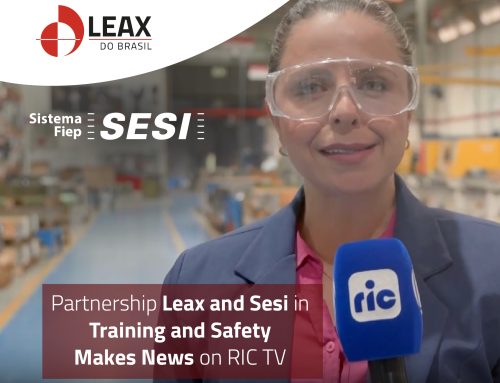Industry 4.0, defined by the integration of technologies like the Internet of Things (IoT), artificial intelligence (AI), Big Data, and automation, is reshaping the global automotive industry. In Brazil, where road transport drives the economy, fleet management for heavy vehicles faces challenges such as high operational costs, carbon emissions, and the need for greater efficiency. Leax do Brasil, a leading manufacturer of high-quality components like propeller shafts, couplings, CNC machining, heat treatment, and assemblies, is keenly aware of these shifts. While still exploring the full potential of 4.0 technologies, the company is positioning itself to support a future where smart, sustainable fleets dominate the roads. This article dives into the future trends of Industry 4.0 in fleet management and how Leax can contribute to the evolution of the heavy vehicle sector.
What is Industry 4.0 in Fleet Management?
Industry 4.0 merges digitalization, connectivity, and automation to create smarter, more efficient systems. In fleet management, this translates to leveraging advanced technologies to monitor, optimize, and predict the performance of heavy vehicles, such as trucks, buses, and mining equipment. These solutions go beyond traditional telematics, integrating real-time data for strategic decision-making. For instance, IoT sensors in propeller shafts can collect data on vibrations or wear, while AI analyzes this data to predict failures, reduce maintenance costs, and minimize emissions. Leax do Brasil, with its expertise in robust components, is well-prepared to supply parts that integrate with these connected fleets, supporting the shift to Logistics 4.0.
Future Trends of Industry 4.0 in Fleet Management
Industry 4.0 technologies are shaping the future of fleet management. Below, we highlight seven trends that will define the heavy vehicle sector in the coming years:
- Predictive Maintenance with IoT and AI
Predictive maintenance is one of Industry 4.0’s most transformative innovations. IoT sensors embedded in components like propeller shafts, produced by Leax, can monitor metrics such as vibrations, temperature, and wear in real time. Processed by AI algorithms, this data predicts failures before they occur, preventing unexpected downtime. For example, a fleet operator could receive an alert about a propeller shaft nearing the end of its lifespan, scheduling maintenance at the optimal time. By 2030, an estimated 80% of commercial fleets in Brazil will adopt predictive maintenance, according to Anfavea projections, driving demand for smart-compatible components.
- Connected Vehicles and Advanced Telematics
Connected vehicles equipped with IoT are the future of logistics. In 2023, 72% of Brazilian fleets used some form of connectivity, per the 2023 Fleet Barometer. By 2030, all new trucks are expected to come factory-equipped with advanced telematics systems, tracking fuel consumption, driver behavior, and road conditions. Leax can support this trend by producing components like couplings with integrated sensors, ensuring compatibility with connected fleets and maintaining durability in demanding applications.
- Artificial Intelligence for Route Optimization
AI is revolutionizing logistics by optimizing routes in real time. Algorithms analyze traffic, weather, and vehicle performance data to suggest the most efficient paths, cutting fuel costs and CO₂ emissions. Cobli data shows clients reduced fuel consumption by 26% with AI, equivalent to 810,000 kg less CO₂ emitted. For Leax, this means crafting components that withstand intensive use on optimized routes, delivering the precision and reliability fleet operators demand.
- Electrification and Sustainability
The shift to electric and hybrid vehicles is a global priority. In Brazil, electric truck sales are projected to grow 61% by 2030, driven by incentives and decarbonization goals. Leax, committed to sustainability (e.g., I-REC certification, Clima Paraná Seal), can innovate by producing components optimized for electric vehicles, such as lighter propeller shafts that reduce energy consumption. Industry 4.0 technologies like telematics also help monitor emissions, supporting companies’ ESG goals.
- Autonomous and Semiautonomous Driving
Semiautonomous trucks, equipped with ADAS (Advanced Driver Assistance Systems), are gaining traction. By 2035, 20% of long-haul trucks in Brazil are expected to have semiautonomous capabilities. These vehicles require high-precision components, like those from Leax, to support sensors and control systems. Leax could explore developing specialized parts, such as couplings with minimal tolerances, to meet the needs of automakers.
- Big Data and Predictive Analytics
Big Data enables the processing of vast fleet datasets, from fuel consumption to driver behavior. By 2030, 90% of Brazilian transport companies are expected to use predictive analytics to cut operational costs, per NTC&Logística. Leax can contribute by supplying components that generate reliable data, such as propeller shafts with IoT sensors, feeding Big Data platforms for strategic decision-making.
- Cybersecurity in Fleet Management
With increased connectivity, cybersecurity is critical. In 2022, 83% of Brazilian companies planned to boost data protection investments, per PwC. Connected fleets require secure systems to safeguard telematics data. Leax can partner with tech providers to ensure future IoT-enabled components feature robust security protocols, protecting sensitive client information.
Leax do Brasil’s Role in the Future of Fleet Management
Leax do Brasil, based in Araucária, Paraná, is renowned for manufacturing high-quality components for heavy vehicles. For Leax, this presents an opportunity to stand out by supplying components that meet the needs of smart, sustainable fleets.
Industry 4.0 in fleet management is shaping the future of the heavy vehicle sector, with technologies like IoT, AI, electrification, and autonomous driving at the forefront. Leax do Brasil, with its expertise in globally recognized components, is well-positioned to support this transformation, whether by developing smart parts or adopting 4.0 processes in production. As Brazil moves toward digitalization, Leax can be a key partner for automakers and fleet operators, blending innovation, sustainability, and efficiency. Ready to prepare your fleet for the future? Contact Leax do Brasil to explore how our solutions can drive your operations forward.
Talk with us
Questions? Make Contact: [email protected]








Leave A Comment